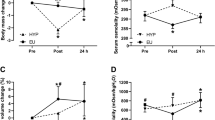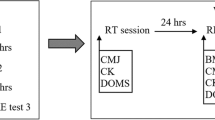Abstract
Purpose
The purpose of the study was to investigate the combined effect of downhill running and heat stress on muscle damage, as well as on heat strain and kidney stress during subsequent running in the heat.
Methods
In a randomized cross-over study, ten non-heat-acclimated, physically active males completed downhill running in temperate (EIMD in Temp) and hot (EIMD in Hot) conditions followed by an exercise-heat stress (HS) test after 3-h seated rest. Blood and urine samples were collected immediately pre- and post-EIMD and HS, and 24 h post-EIMD (post-24 h). Core temperature and thermal sensation were measured to evaluate heat strain. Serum creatine kinase (CK), maximal voluntary isometric contraction of the quadriceps (MVC) and perceived muscle soreness were measured to evaluate muscle damage. Urinary neutrophil gelatinase-associated lipocalin (NGAL) and kidney injury molecule-1 (KIM-1) levels were measured to indicate acute kidney stress.
Results
CK, MVC and perceived soreness were not different between conditions at any timepoints. In the EIMD in Hot condition, urinary NGAL was significantly elevated from pre- to post-HS (pre-HS: 6.56 {1.53–12.24} ng/min, post-HS: 13.72 {7.67–21.46} ng/min, p = 0.034). Such elevation of NGAL or KIM-1 was not found in the EIMD in Temp condition.
Conclusions
As compared with downhill running in a temperate environment, downhill running in a hot environment does not appear to aggravate muscle damage. However, elevated NGAL levels following EIMD in a hot environment suggest such exercise may increase risk of mild acute kidney injury during subsequent endurance exercise in the heat.



Similar content being viewed by others
Abbreviations
- EHS:
-
Exertional heat stroke
- EIMD:
-
Exercise-induced muscle damage
- NGAL:
-
Neutrophil gelatinase-associated lipocalin
- AKI:
-
Acute kidney injury
- KIM-1:
-
Kidney injury molecule-1
- HS:
-
Heat stress
- HR:
-
Heart rate
- RPE:
-
Rating of perceived exertion
- MVC:
-
Maximal voluntary isometric contraction
- RH:
-
Relative humidity
- CK:
-
Creatine kinase
- VAS:
-
Visual analog scale
- ELISA:
-
Enzyme-linked immunosorbent assays
- CV:
-
Coefficient of variation
- SD:
-
Standard deviation
References
Armstrong LE, Casa DJ, Millard-Stafford M et al (2007) Exertional heat illness during training and competition. Med Sci Sports Exerc 39:556–572. https://doi.org/10.1249/MSS.0b013e31802fa199
Bischof JC, Padanilam J, Holmes WH et al (1995) Dynamics of cell membrane permeability changes at supraphysiological temperatures. Biophys J 68:2608–2614
Bonauto D, Anderson R, Rauser E, Burke B (2007) Occupational heat illness in Washington State, 1995–2005. Am J Ind Med 50:940–950. https://doi.org/10.1002/ajim.20517
Borg GAV (1982) Psychophysical bases of perceived exertion. Med Sci Sports Exerc 14:377–381. https://doi.org/10.1249/00005768-198205000-00012
Castellani JW, Zambraski EJ, Sawka MN, Urso ML (2016) Does high muscle temperature accentuate skeletal muscle injury from eccentric exercise? Phys Rep 4:e12777. https://doi.org/10.14814/phy2.12777
Chapman CL, Johnson BD, Vargas NT et al (2020) Both hyperthermia and dehydration during physical work in the heat contribute to the risk of acute kidney injury. J Appl Physiol 128:715–728. https://doi.org/10.1152/japplphysiol.00787.2019
Chen TC, Nosaka K, Tu J-H (2007) Changes in running economy following downhill running. J Sports Sci 25:55–63. https://doi.org/10.1080/02640410600718228
Clarkson PM, Hubal MJ (2002) Exercise-induced muscle damage in humans. Am J Phys Med Rehabil 81:S52–S69. https://doi.org/10.1097/00002060-200211001-00007
Devarajan P (2008) Neutrophil gelatinase-associated lipocalin (NGAL). Scand J Clin Lab Investing Suppl 241:89–94. https://doi.org/10.1080/00365510802150158
Dill DB, Costill DL (1974) Calculation of percentage changes in volumes of blood, plasma, and red cells in dehydration. J Appl Physiol 37:247–248. https://doi.org/10.1152/jappl.1974.37.2.247
Fortes MB, Di Felice U, Dolci A et al (2013) Muscle-damaging exercise increases heat strain during subsequent exercise heat stress. Med Sci Sports Exerc 45:1915–1924. https://doi.org/10.1249/MSS.0b013e318294b0f8
Han WK, Bailly V, Abichandani R et al (2002) Kidney Injury Molecule-1 (KIM-1): a novel biomarker for human renal proximal tubule injury. Kidney Int 62:237–244. https://doi.org/10.1046/j.1523-1755.2002.00433.x
Jackson AS, Pollock ML (1978) Generalized equations for predicting body density of men. Br J Nutr 40:497–504. https://doi.org/10.1079/BJN19780152
Junglee NA, Di Felice U, Dolci A et al (2013) Exercising in a hot environment with muscle damage: effects on acute kidney injury biomarkers and kidney function. Am J Physiol Renal Physiol 305:F813–F820. https://doi.org/10.1152/ajprenal.00091.2013
Kim J, Lee J, Kim S et al (2016) Exercise-induced rhabdomyolysis mechanisms and prevention: a literature review. J Sport Health Sci 5:324–333. https://doi.org/10.1016/j.jshs.2015.01.012
Knochel JP (1982) Rhabdomyolysis and Myoglobinuria. Annu Rev Med 33:435–443. https://doi.org/10.1146/annurev.me.33.020182.002251
Li Z, McKenna ZJ, Kuennen MR et al (2021) The potential role of exercise-induced muscle damage in exertional heat stroke. Sports Med 51:863–872. https://doi.org/10.1007/s40279-021-01427-8
Maron BJ, Haas TS, Ahluwalia A et al (2016) Demographics and epidemiology of sudden deaths in young competitive athletes: from the United States national registry. Am J Med 129:1170–1177. https://doi.org/10.1016/j.amjmed.2016.02.031
Muldoon S, Deuster P, Voelkel M et al (2008) Exertional heat illness, exertional rhabdomyolysis, and malignant hyperthermia: is there a link? Curr Sports Med Rep 7:7
Nejat M, Pickering JW, Devarajan P et al (2012) Some biomarkers of acute kidney injury are increased in pre-renal acute injury. Kidney Int 81:1254–1262. https://doi.org/10.1038/ki.2012.23
Pajek J, Škoberne A, Šosterič K et al (2014) Non-inferiority of creatinine excretion rate to urinary L-FABP and NGAL as predictors of early renal allograft function. BMC Nephrol 15:117. https://doi.org/10.1186/1471-2369-15-117
Peake JM, Suzuki K, Wilson G et al (2005) Exercise-induced muscle damage, plasma cytokines, and markers of neutrophil activation. Med Sci Sports Exerc 37:737–745. https://doi.org/10.1249/01.MSS.0000161804.05399.3B
Scarneo SE, Hosokawa Y, Belval LN et al (2018) Occupational settings: considerations for the laborer. In: Casa DJ (ed) Sport and physical activity in the heat: maximizing performance and safety. Springer, Cham, pp 277–290
Schinstock CA, Semret MH, Wagner SJ et al (2013) Urinalysis is more specific and urinary neutrophil gelatinase-associated lipocalin is more sensitive for early detection of acute kidney injury. Nephrol Dial Transplant 28:1175–1185. https://doi.org/10.1093/ndt/gfs127
Schlader ZJ, Hostler D, Parker MD et al (2019) The potential for renal injury elicited by physical work in the heat. Nutrients 11:2087. https://doi.org/10.3390/nu11092087
Sirota JC, Walcher A, Faubel S et al (2013) Urine IL-18, NGAL, IL-8 and serum IL-8 are biomarkers of acute kidney injury following liver transplantation. BMC Nephrol 14:17. https://doi.org/10.1186/1471-2369-14-17
Waikar SS, Sabbisetti VS, Bonventre JV (2010) Normalization of urinary biomarkers to creatinine during changes in glomerular filtration rate. Kidney Int 78:486–494. https://doi.org/10.1038/ki.2010.165
White JP, Wilson JM, Austin KG et al (2008) Effect of carbohydrate-protein supplement timing on acute exercise-induced muscle damage. J Int Soc Sports Nutr 5:5. https://doi.org/10.1186/1550-2783-5-5
Xin C, Yulong X, Yu C et al (2008) Urine neutrophil gelatinase-associated lipocalin and interleukin-18 predict acute kidney injury after cardiac surgery. Ren Fail 30:904–913. https://doi.org/10.1080/08860220802359089
Funding
This study was partially funded by the Graduate and Professional Student Association and the Exercise Physiology Laboratories at the University of New Mexico (New Mexico Research Grant 2019).
Author information
Authors and Affiliations
Contributions
FA and ZL conceived the experiments. ZL, ZM, FCM, MK, CM and FA designed the experiments. ZL, ZM, ZF, RN, AW, JD, JH, and KM collected data. ZL and ZM analyzed data. ZL drafted the manuscript. All authors contributed to the final manuscript.
Corresponding author
Ethics declarations
Conflict of interest
The authors declare that they have no conflicts of interest.
Ethics approval
This study was approved by the Institutional Review Board at the University of New Mexico Main Campus (IRBNet ID: 1520480).
Consent to participate
All participants have read and signed an informed consent prior to participating in the study.
Additional information
Communicated by Narihiko Kondo.
Publisher's Note
Springer Nature remains neutral with regard to jurisdictional claims in published maps and institutional affiliations.
Rights and permissions
About this article
Cite this article
Li, Z., McKenna, Z., Fennel, Z. et al. The combined effects of exercise-induced muscle damage and heat stress on acute kidney stress and heat strain during subsequent endurance exercise. Eur J Appl Physiol 122, 1239–1248 (2022). https://doi.org/10.1007/s00421-022-04919-1
Received:
Accepted:
Published:
Issue Date:
DOI: https://doi.org/10.1007/s00421-022-04919-1




